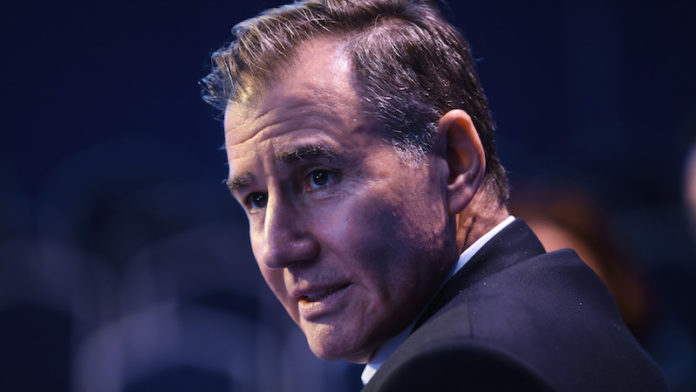
GLENCORE would install its next generation of managers in the early part of 2020 whereafter Ivan Glasenberg, CEO of the Swiss-based mining and trading group for nearly 18 years, would consider stepping aside.
“There are not many of the old guys left,” he said in an investor update today. “When new management is in place, which will be as early as possible … I will move aside.” He added, however, that one of the crop of new managers would “have to be ready” first.
“It could be quite soon.”
Glencore’s succession strategy appears to have been accelerated because Glasenberg was quoted last year as saying installing fresh management would be done over a two- to three-year period. Glasenberg, who turns 63 in January, described the new managers as the firm’s fourth generation.
He also defended the appointment of Peter Freyberg as head of the group’s industrial assets, saying that the group had evolved from a company fronted by traders during its 2013 IPO in London to a structure in which the assets were run more efficiently.
“With Peter, he’s coordinates the asset managers so they don’t operate in silos. [Previously] You had me at the top, but I can’t look into every asset,” said Glasenberg. He added that asset managers always worked side-by-side with the trading executives even during its early years as a listed company.
Glasenberg also acknowledged that the group had failed to make a mark in the upstream oil business, preferring now to focus on the downstream business.
He said Glencore had been flattered by its early success drilling oil in Equatorial Guinea, but its expensive Chad incursion had suggested it didn’t understand the market. “Downstream is more of a trading business. We will see how it goes,” he said.
COAL EXPOSURE
As expected by analysts this week, Glasenberg used much of the investor update to make the investment case for Glencore, the share of which has under-performed its peer group this year. The group has laboured following production problems at its African Copper unit, an investigation into trading activities by the US Department of Justice, and because it is heavily exposed to the thermal coal market.
Shares in Glencore have fallen about 21.8% year to date which compares to gains in the share prices of Anglo American, Rio Tinto and BHP which were 20%, 18.7% and 10.4% higher year to date respectively. Even in trade today, Glencore recorded greater losses, down at the time of writing some 3.95% against 1.66% and 2.63% in Anglo and BHP respectively.
Glasenberg argued that renewable power was not in a position to replace entirely the baseload power provided by thermal coal. Coal’s market share in the world energy market would fall to 22% to 23% by 2030 compared to 26% of the energy market today. However, coal demand would grow volumetrically as renewable energy sources failed to match total energy demand.
“Right now investors have not told us they will divest [from the company”, said Glasenberg. “We believe coal has a future,” he said, adding – by way of example – that new power station builds in Indonesia would absorb its export tons which comprise 42% of world demand.
AFRICAN COPPER
Glencore said its operating assets had largely met production guidance, but it had fallen down on its ramp-up assets, especially in African Copper where it was building output at Mopani in Zambia and Katanga in the Democratic Republic of Congo (DRC).
Copper guidance for the 2020 financial year was for 85,000 tons less copper at some 1.3 million tons compared to the 1.85 million tons likely to be produced this year.
Copper production for 2020 was also affected by the shut-down of the DRC’s Mutanda mine, announced earlier this year, owing to weakness in the cobalt market (which is a by-product of copper) and new taxes imposed by the DRC’s government in 2018.
The DRC assets, and those in Zambia, were also largely behind a deterioration in Glencore’s safety standards. “We are in a bad place,” said Freyberg of some 16 fatalities so far this year. “We know what to do to fix it and we are doing it,” he said.










